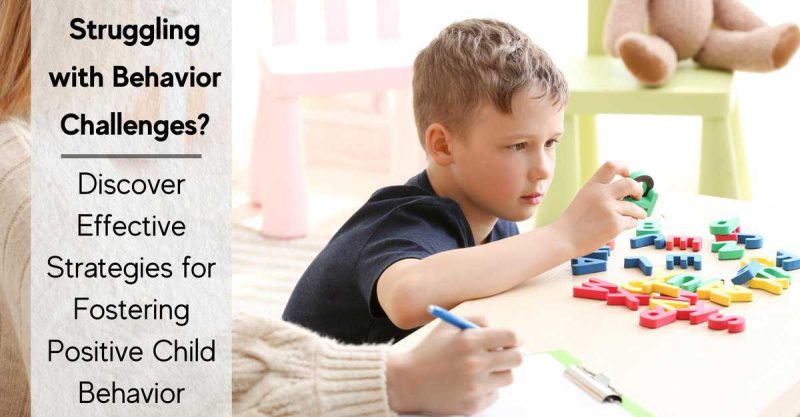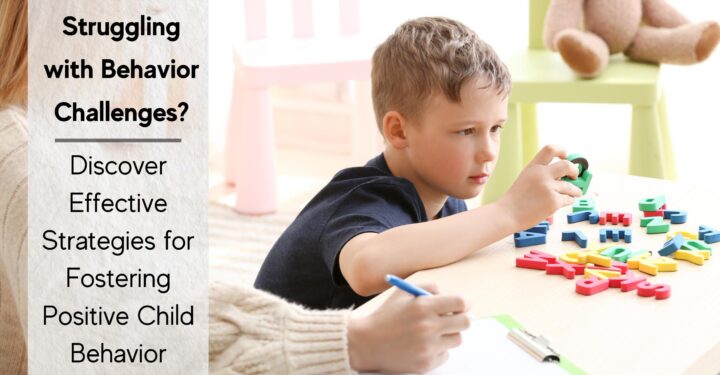Practical Strategies for Nurturing Positive Child Behavior

Parenting is a journey filled with joy, but it can also come with its fair share of challenges. One of the most common struggles parents face is managing their child’s behavior. Whether it’s tantrums, defiance, or difficulty following instructions, behavior challenges can test even the most patient of parents. However, with the right strategies and a positive mindset, it is possible to nurture positive child behavior and create a harmonious family environment.

Positive Parenting: The Key to Success!
When it comes to promoting positive behavior in children, positive parenting is the cornerstone. Positive parenting is an approach that focuses on nurturing and guiding children rather than using punishment or negative reinforcement. By emphasizing positive reinforcement, open communication, and setting appropriate boundaries, parents can create an environment that promotes healthy behavior.
Behavior Management: Setting Clear Expectations
Clear expectations are vital for managing behavior challenges effectively. Children thrive when they understand what is expected of them. Start by setting clear, developmentally appropriate rules and boundaries. Clearly communicate these expectations to your child and reinforce them consistently. When expectations are unclear, children can become confused, leading to behavioral challenges. Consistency is key – be sure to follow through with consequences when expectations are not met.
Understanding Child Development: Age-Appropriate Expectations
Understanding your child’s developmental stage is essential for setting appropriate behavior expectations. Each age group has different capabilities and limitations. For example, toddlers have limited impulse control and may struggle with following instructions. Preschoolers may display defiance as they seek autonomy. By understanding these developmental milestones, parents can adjust their expectations accordingly and respond to challenging behavior in a constructive manner.
Behavior Support: Reinforcing Positive Choices
Reinforcing positive behavior is a powerful tool for promoting positive child behavior. Praise your child for demonstrating desired behavior and provide specific feedback on what they did well. This not only boosts their self-esteem but also encourages them to continue making positive choices. Additionally, offering rewards, such as small privileges or extra playtime, can motivate children to make better choices.
Consistency and Routine: Establishing Stability
Children thrive on consistency and routine. Having predictable daily routines can help reduce behavior challenges. Establish regular mealtimes, consistent bedtimes, and set aside time for play and family activities. When children know what to expect, they feel secure and are better able to manage their emotions and behavior.
Parenting Strategies: The Power of Positive Communication
Having open and positive communication with your child is vital for addressing behavior challenges. Instead of resorting to yelling or punishment, use constructive communication techniques. Encourage your child to express their emotions and thoughts through active listening and empathy. By understanding their perspective, you can effectively address the root cause of their behavior issues.
Teaching Problem-Solving Skills: Empowering Children
Empowering children with problem-solving skills is an essential step in nurturing positive behavior. Teach them how to identify their emotions and find appropriate ways to manage them. Encourage them to brainstorm solutions to conflicts and provide guidance on making good choices. By empowering your child to find their own solutions, you help them develop essential life skills and reduce behavior challenges.
Parenting can be tough, but with practical strategies and a positive approach, you can successfully navigate behavior challenges and nurture positive child behavior. Remember that every child is unique and finding the strategies that work best for your family may take time and patience.
By focusing on positive parenting, setting clear expectations, reinforcing positive choices, establishing stability, and engaging in positive communication, you will provide your child with the guidance they need to thrive and grow into responsible and well-behaved individuals.








